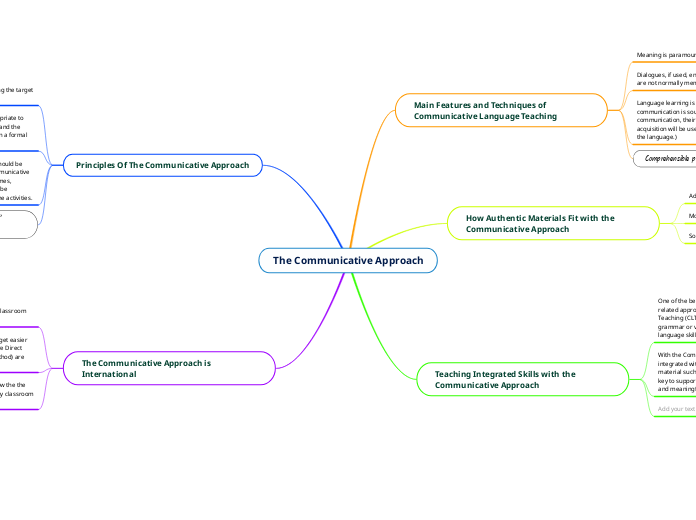The Communicative Approach
Main Features and Techniques of Communicative Language Teaching
Meaning is paramount.
Dialogues, if used, enter around communicative functions and are not normally memorized.
Language learning is learning to communicate and effective communication is sought. (When learners are involved in real communication, their natural strategies for language acquisition will be used, and this will allow them to learn to use the language.)
Comprehensible pronunciation is sought.
How Authentic Materials Fit with the Communicative Approach
Ad Banners, advertisements, billboards
Movies, scripts, commercials
Social media, YouTube, phonebooks
Teaching Integrated Skills with the Communicative Approach
One of the benefits of the Communicative Approach and related approaches under the Communicative Language Teaching (CLT) umbrella is that teachers can integrate a grammar or vocabulary lesson with receptive and productive language skills.
With the Communicative Approach, a grammar lesson can be integrated with a speaking lesson creatively. Authentic material such as movies, newspapers, comics, and songs is key to supporting English language learning in an enjoyable and meaningful context to students.
Add your text
Principles Of The Communicative Approach
Language learning is learning to communicate using the target language.
The language used to communicate must be appropriate to the situation, the roles of the speakers, the setting and the register. The learner needs to differentiate between a formal and an informal style.
Communicative activities are essential. Activities should be presented in a situation or context and have a communicative purpose. Typical activities of this approach are: games, problem-solving tasks, and role-play. There should be information gap, choice and feedback involved in the activities.
Motivation is central. Teachers should raise students’ interest from the beginning of the lesson.
The Communicative Approach is International
The Communicative Approach is used in different classroom settings worldwide.
With proper training and a bit of experience, it can get easier to implement in large classes of 40+ students where Direct Method or Audio-lingual (known as Army-style method) are more commonly used.
OnTESOL graduates have written extensively on how the the Communicative Approach helped them adapt to any classroom situation in the world!
